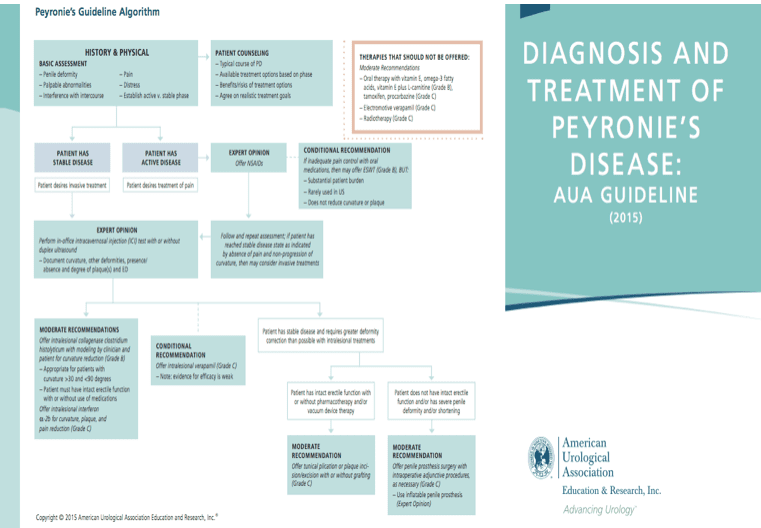Successful Peyronie’s Disease Treatment Options Exist but Not All Therapies Created Equal
Developing penile curvature and deformity can be an alarming as well embarrassing. Penile curvature that occurs later in a man’s life, and usually from trauma is called Peyronie’s Disease (pronounced pay-roh-neez di-zeez). Peyronie’s Disease (PD) is a common disease that affects more than 200,000 American’s per year, and about 10 % of adult men have PD. Usually this disease process is relatively easy to diagnose and many treatments exist. Unfortunately, since this disease process can cause significant psychological effects it is likely more common than we think. Urologists like myself, who specialize in sexual medicine, feel strongly that men should seek help when dealing with penile deformity, erectile dysfunction and psychological stress that often accompanies PD.
Recently, the American Urology Association released guidelines on Peyronie Disease’s diagnosis and treatment. The purpose of this guideline is to provide guidance to patients and medical professionals in the recognition, diagnosis, and treatment of Peyronie’s Disease to ensure that the symptoms of Peyronies are properly managed, sexual function is optimized and overall quality of life is improved for the man and their partner.
The guideline recommends a history and physical of all men who complain of penile deformity followed by an intracavernosal injection (ICI) test which allow an objective assessment of the penile curve or abnormality. Often I will perform a non-invasive ultrasound simultaneously to assess the blood flow in and out of the penis that may allow assessment of ED, and Peyronie’s disease characteristics.
The guidelines suggest medical and procedural options to assist in minimizing symptoms and optimizing sexual function. Since Peyronie’s disease is a benign process, meaning not associated with cancer, it mainly affects the quality of life of the man and his partner. Knowing this, a review of all treatment options is given, and the individual and their partner are allowed to choose the option that best suits their needs with guidance from the urologist.
Medical options include antioxidants and non-steroidal anti-inflammatory drugs (NSAIDs) agents. NSAIDs may be used to alleviate pain associated with Peyronie’s disease which usually occurs during erections. Most medications classically recommended for Peyronie’s disease like Vitamin E, Potaba®, L-carnitine, L- arginine, and colchicine have limited benefit and significant reductions in curvature should not be expected with their use. Most of these medications especially Vitamin E, L-arginine and L carnitine are widely used mainly because they are safe with only mild side effects.
Electromotive therapy with verapamil, extracorporeal shock wave therapy (ESWT), and radiation therapy are not recommended for Peyronie’s Disease with the exception of ESWT for penile pain.
Injection therapy into the plaque with interferon α-2b, or verapamil are both successful options that help prevent curvature, possibly improve curvature and may decrease penile pain in the early phase of Peyronie’s disease.
Once the penile curvature, pain and deformity have stabilized other more effective options are available to restore proper sexual function and well-being. Intralesional collagenase aka Xiaflex® is the only medication approved by the FDA to help correct penile curvature. Usually small volumes of this medication are directly placed into the lump at regular intervals followed by stretching by the medical provider and patient. Significant reductions in curvature and improved patient satisfaction may be expected.
If erectile function is optimal, and the goal is to be as straight as possible then tunical plication or plaque excision with grafting may be offered as an outpatient procedure. If erections are poor due to the Peyronie’s disease or pre-existing ED a penile implant may be placed and the curvature/deformity will be corrected at the time of the procedure usually offering excellent functional and satisfaction outcomes.
Anand Shridharani, MD is a board certified fellowship trained specialist in male reproductive and prosthetic urology with UT Erlanger Urology in Chattanooga, TN. Contact Dr. Shridharani today at 423-778-6941 if you are suffering from Peyronie’s disease and need treatment.



